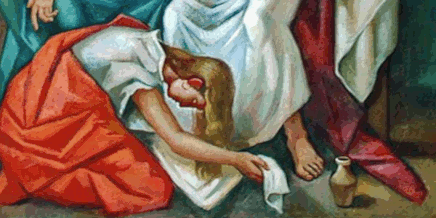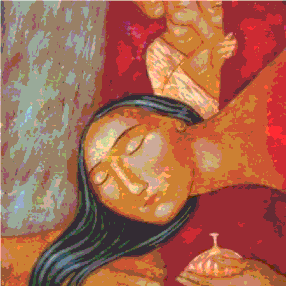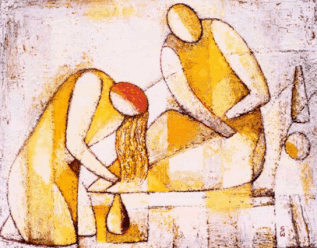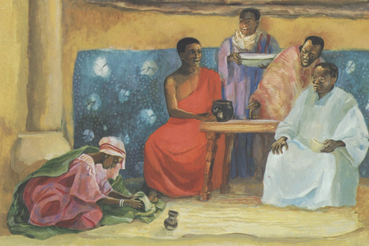- Home
-
Devotions
- Responding to Covid-19 Together
- Pastor's Devotions - May - June 2020 >
-
Pastor's Devotions - March - April 2020
>
- March 24, 2020
- March 25, 2020
- March 26, 2020
- March 27, 2020
- March 28, 2020
- March 30, 2020
- March 31, 2020
- April 1, 2020
- April 2, 2020
- April 3, 2020
- April 4, 2020
- April 6, 2020
- April 7, 2020
- April 8, 2020
- April 9, 2020
- April 15, 2020
- April 16, 2020
- April 17, 2020
- April 21, 2020
- April 22, 2020
- April 23, 2020
- April 24, 2020
- April 28, 2020
- April 29, 2020
- April 30, 2020
- Newsletters
- Calendar
- Worship
- Events
- Tenants
- Giving
NPC Daily Devotional
Wednesday of Holy Week
Wednesday of Holy Week
Wednesday of Holy Week is traditionally called "Spy Wednesday" because Judas bargained with the High Priest to turn betray Jesus for thirty silver pieces (Matt 26:14-16; Mark 14:10-11; Luke 22:1-6). In Poland, the young people throw an effigy of Judas from the top of a church steeple. Then it is dragged through the village amidst hurling sticks and stones. What remains of the effigy is drowned in nearby stream or pond.
This is also the day that Jesus was anointed with an expensive jar of alabaster by the woman at Bethany, in the house of Simon the leper (Matt 26:6-13; Mark 14:3-9; John 12:1-19)
1) Prayer
Take a deep breath, then be still for a moment; then pray, perhaps,
God of all creation, giver of new life, we bless you, and we thank you for the gift of our community. Though we continue to be apart today, give us a sense that we remain your gathered people.
In these moments, calm and quiet our hearts. Open us where we are broken. Speak to us so that we can hear. Help us listen in a way that opens us to your healing.
Help us understand, believe, and follow, to your glory and our joy. In Jesus’ name. Amen.
2) Readings
Read Mark 14:1-11
Lord Jesus, don't let me lie when I say that I love you...
and protect me today,
for I could betray you.
- St. Augustine
Mark 14:1-11
It was two days before the Passover and the festival of Unleavened Bread. The chief priests and the scribes were looking for a way to arrest Jesus by stealth and kill him; for they said, “Not during the festival, or there may be a riot among the people.”
While he was at Bethany in the house of Simon the leper, as he sat at the table, a woman came with an alabaster jar of very costly ointment of nard, and she broke open the jar and poured the ointment on his head. But some were there who said to one another in anger, “Why was the ointment wasted in this way? For this ointment could have been sold for more than three hundred denarii, and the money given to the poor.” And they scolded her.
But Jesus said, “Let her alone; why do you trouble her? She has performed a good service for me. For you always have the poor with you, and you can show kindness to them whenever you wish; but you will not always have me. She has done what she could; she has anointed my body beforehand for its burial. Truly I tell you, wherever the good news is proclaimed in the whole world, what she has done will be told in remembrance of her.”
Then Judas Iscariot, who was one of the twelve, went to the chief priests in order to betray him to them. When they heard it, they were greatly pleased, and promised to give him money. So he began to look for an opportunity to betray him.
This is also the day that Jesus was anointed with an expensive jar of alabaster by the woman at Bethany, in the house of Simon the leper (Matt 26:6-13; Mark 14:3-9; John 12:1-19)
1) Prayer
Take a deep breath, then be still for a moment; then pray, perhaps,
God of all creation, giver of new life, we bless you, and we thank you for the gift of our community. Though we continue to be apart today, give us a sense that we remain your gathered people.
In these moments, calm and quiet our hearts. Open us where we are broken. Speak to us so that we can hear. Help us listen in a way that opens us to your healing.
Help us understand, believe, and follow, to your glory and our joy. In Jesus’ name. Amen.
2) Readings
Read Mark 14:1-11
- Read through it once.
- Read it again, more slowly, noting what stands out to you
- Read the sentences, phrases, or even single words again, slowly and aloud, repeating them as you wisha
- Reflect on the phrases and words that caught your attention. Pray for insight regarding the significance of those parts of the passage to your life today.
Lord Jesus, don't let me lie when I say that I love you...
and protect me today,
for I could betray you.
- St. Augustine
Mark 14:1-11
It was two days before the Passover and the festival of Unleavened Bread. The chief priests and the scribes were looking for a way to arrest Jesus by stealth and kill him; for they said, “Not during the festival, or there may be a riot among the people.”
While he was at Bethany in the house of Simon the leper, as he sat at the table, a woman came with an alabaster jar of very costly ointment of nard, and she broke open the jar and poured the ointment on his head. But some were there who said to one another in anger, “Why was the ointment wasted in this way? For this ointment could have been sold for more than three hundred denarii, and the money given to the poor.” And they scolded her.
But Jesus said, “Let her alone; why do you trouble her? She has performed a good service for me. For you always have the poor with you, and you can show kindness to them whenever you wish; but you will not always have me. She has done what she could; she has anointed my body beforehand for its burial. Truly I tell you, wherever the good news is proclaimed in the whole world, what she has done will be told in remembrance of her.”
Then Judas Iscariot, who was one of the twelve, went to the chief priests in order to betray him to them. When they heard it, they were greatly pleased, and promised to give him money. So he began to look for an opportunity to betray him.
b) Read John 12:1-11
John 12:1-11
Six days before the Passover Jesus came to Bethany, the home of Lazarus, whom he had raised from the dead. There they gave a dinner for him. Martha served, and Lazarus was one of those at the table with him. Mary took a pound of costly perfume made of pure nard, anointed Jesus’ feet, and wiped them with her hair. The house was filled with the fragrance of the perfume.
But Judas Iscariot, one of his disciples (the one who was about to betray him), said, “Why was this perfume not sold for three hundred denarii and the money given to the poor?” (He said this not because he cared about the poor, but because he was a thief; he kept the common purse and used to steal what was put into it.)
Jesus said, “Leave her alone. She bought it so that she might keep it for the day of my burial. You always have the poor with you, but you do not always have me.”
When the great crowd of the Jews learned that he was there, they came not only because of Jesus but also to see Lazarus, whom he had raised from the dead. So the chief priests planned to put Lazarus to death as well, since it was on account of him that many of the Jews were deserting and were believing in Jesus.
- As above, read through it once.
- Read it again, more slowly, noting what stands out to you
- Read the sentences, phrases, or even single words again, slowly and aloud, repeating them as you wisha
- Reflect on the phrases and words that caught your attention. Pray for insight regarding the significance of those parts of the passage to your life today.
John 12:1-11
Six days before the Passover Jesus came to Bethany, the home of Lazarus, whom he had raised from the dead. There they gave a dinner for him. Martha served, and Lazarus was one of those at the table with him. Mary took a pound of costly perfume made of pure nard, anointed Jesus’ feet, and wiped them with her hair. The house was filled with the fragrance of the perfume.
But Judas Iscariot, one of his disciples (the one who was about to betray him), said, “Why was this perfume not sold for three hundred denarii and the money given to the poor?” (He said this not because he cared about the poor, but because he was a thief; he kept the common purse and used to steal what was put into it.)
Jesus said, “Leave her alone. She bought it so that she might keep it for the day of my burial. You always have the poor with you, but you do not always have me.”
When the great crowd of the Jews learned that he was there, they came not only because of Jesus but also to see Lazarus, whom he had raised from the dead. So the chief priests planned to put Lazarus to death as well, since it was on account of him that many of the Jews were deserting and were believing in Jesus.
3) For Reflection:
There is Mary Magdalene. According to tradition, she was a mixed bag. Maybe a prostitute, definitely not proper; she had a ‘sullied reputation.’ Definitely a model for passionate, sacrificial devotion to Jesus.
Then there is Judas. He insisted on caring for the poor, but he didn’t mean it. He betrayed Jesus, “betrayed” being too small a word; he took money for the service of informing Jesus’ enemies of Jesus’ whereabouts so that they could kill him. “Satan entered him;” there isn’t any suggestion that Judas offered any resistance.
Mary Magdalene and Judas. Stark contrast. Magnets repelling one another. A convenient, tension-reducing way for us to organize them inside ourselves. Very difficult that within each of us individuals, there are aspects of ourselves that correspond to Mary and to Judas. Very difficult that there’s the two of them but just one of us.
There is Mary Magdalene. According to tradition, she was a mixed bag. Maybe a prostitute, definitely not proper; she had a ‘sullied reputation.’ Definitely a model for passionate, sacrificial devotion to Jesus.
Then there is Judas. He insisted on caring for the poor, but he didn’t mean it. He betrayed Jesus, “betrayed” being too small a word; he took money for the service of informing Jesus’ enemies of Jesus’ whereabouts so that they could kill him. “Satan entered him;” there isn’t any suggestion that Judas offered any resistance.
Mary Magdalene and Judas. Stark contrast. Magnets repelling one another. A convenient, tension-reducing way for us to organize them inside ourselves. Very difficult that within each of us individuals, there are aspects of ourselves that correspond to Mary and to Judas. Very difficult that there’s the two of them but just one of us.
4) Prayers
Most loving God, Creator of us all,
we turn to you to care for your people in need.
We thank you for your presence among us and the peace you offer us.
Send us your Spirit to fill us with courage and hope,
so that we might be your instruments of love and assistance for others in need.
Through this crisis, may we come together,
as people of faith in a crisis so often do by your grace,
and may we come out of it more united and more determined
to care for those most in need.
Thank you for your fidelity and the graces we need these days.*
https://onlineministries.creighton.edu/CollaborativeMinistry/Praying-in-the-time-of-the-virus.html
Most loving God, Creator of us all,
we turn to you to care for your people in need.
We thank you for your presence among us and the peace you offer us.
Send us your Spirit to fill us with courage and hope,
so that we might be your instruments of love and assistance for others in need.
Through this crisis, may we come together,
as people of faith in a crisis so often do by your grace,
and may we come out of it more united and more determined
to care for those most in need.
Thank you for your fidelity and the graces we need these days.*
- for ongoing insight about the applicability of these passages for you
- for an awareness of God’s love and tenderness toward you, especially in the context of these difficult, challenging teachings
- for our community’s ability to understand the significance of these passages for us
- for yourself and your loved ones.
- for our church, our community, and our world, particularly in light of the pandemic
- Thank God for meeting you, for the opportunity to sit, read, and pray, and pray for an awareness of God's presence through the day
https://onlineministries.creighton.edu/CollaborativeMinistry/Praying-in-the-time-of-the-virus.html
Psalm 70
Be pleased, O God, to deliver me.
O Lord, make haste to help me!
Let those be put to shame and confusion
who seek my life.
Let those be turned back and brought to dishonor
who desire to hurt me.
Let those who say, “Aha, Aha!”
turn back because of their shame.
Let all who seek you
rejoice and be glad in you.
Let those who love your salvation
say evermore, “God is great!”
But I am poor and needy;
hasten to me, O God!
You are my help and my deliverer;
O Lord, do not delay!
Be pleased, O God, to deliver me.
O Lord, make haste to help me!
Let those be put to shame and confusion
who seek my life.
Let those be turned back and brought to dishonor
who desire to hurt me.
Let those who say, “Aha, Aha!”
turn back because of their shame.
Let all who seek you
rejoice and be glad in you.
Let those who love your salvation
say evermore, “God is great!”
But I am poor and needy;
hasten to me, O God!
You are my help and my deliverer;
O Lord, do not delay!






